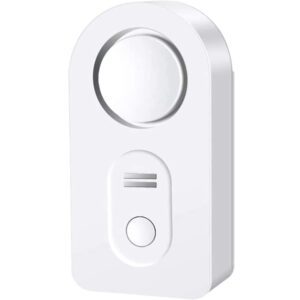Let’s face it: Water damage is a silent killer for American homeowners. Picture this: You’re on vacation, sipping margaritas on a beach, when a pipe bursts in your basement. By the time you return, your floors are ruined, mold is spreading, and your insurance claim hits 50 gadget could’ve alerted you the second that leak started? That’s the power of water leak detectors—your home’s invisible bodyguard against water disasters.
In this guide, we’ll break down why these devices are no longer optional for U.S. homeowners. You’ll learn how they work, where to place them, and which models top the charts in 2024. Let’s dive in.
Why Water Damage Should Keep You Up at Night
Water isn’t just essential for life—it’s also a master of destruction. Here’s why it’s a bigger threat than you think:
- Costs are skyrocketing: The average insurance claim for water damage is $11,000, and that’s before factoring in mold remediation or temporary housing.
- It’s everywhere: 30% of homeowners insurance claims are water-related. From frozen pipes in Minnesota to hurricane floods in Florida, no state is immune.
- Small leaks = big problems: A dripping faucet wastes 3,000+ gallons yearly (EPA), but a hidden pipe leak can rot your walls for months before you notice.
But here’s the good news: 90% of water damage is preventable with early detection. That’s where water leak detectors come into play.
How Water Leak Detectors Work (No Engineering Degree Required)
Think of these devices as your home’s “water police.” They’re designed to sniff out trouble in high-risk zones like under sinks, near water heaters, or in basements. Here’s the breakdown:
The Tech Behind the Magic
- Moisture Sensors: Basic models use probes that trigger alarms when water touches them.
- Wi-Fi + Apps: Smart detectors (like Phyn or Moen Flo) ping your phone via apps—even if you’re at work or on vacation.
- Auto-Shutoff Systems: Premium systems ($$$) link to your main water line, stopping floods in seconds.
Pro Tip: Pair them with smart speakers like Alexa for voice alerts. “Hey Google, is my basement flooding?” isn’t sci-fi anymore.
Types of Water Leak Detectors: From Budget to Baller
Not all detectors are created equal. Let’s match you with the right one:
1. Basic “Screamers” (20−50)
- What they do: Emit a loud alarm when water’s detected.
- Best for: Renters, or homeowners who want DIY protection under sinks/appliances.
- Drawback: No remote alerts. If you’re not home, you won’t know until it’s too late.
2. Smart Detectors (60−200)
- Perks: Send texts/app alerts, track humidity, and sync with smart home systems.
- MVP: Honeywell Lyric – Affordable, customizable, and works with Apple HomeKit.
3. Whole-Home Systems ($500+)
- The Cadillac option: Devices like Phyn Plus 2.0 monitor water pressure 24/7, learn your usage patterns, and automatically shut off water if they spot a leak.
- Bonus: Some insurers (like State Farm) offer discounts for installing these.
5 Reasons Your Home Needs a Leak Detector Yesterday
1. Stop “Slow Burn” Disasters
That “mystery” water stain on your ceiling? It’s likely a $5,000 roof leak. Detectors catch issues before they escalate.
2. Vacation-Proof Your Home
A leak during a 2-week trip can mean $20k+ in repairs. Smart detectors let neighbors or plumbers intervene ASAP.
3. Mold Prevention = Health Protection
Mold thrives in 24-48 hours of dampness. Early leak detection = no toxic spores invading your air.
4. Insurance Perks
Many insurers (Allstate, Farmers) offer 5-10% discounts for leak detection systems.
5. Water Conservation
Fix a leaky toilet, save 200+ gallons daily—good for both your wallet and the planet.
Where to Place Detectors for Maximum Protection
Strategy matters. Install these in the “Water Damage Danger Zones”:
- Under all sinks (kitchen/bathrooms) – 55% of leaks start here.
- Behind appliances: Washing machines, dishwashers, and refrigerators with ice makers.
- Basement/Crawl Spaces: Prime flood territory.
- Near water heaters: A burst tank = 50+ gallons of chaos.
- Attic/Bathroom ceilings: Catch roof leaks before they ruin drywall.
Pro Hack: Place sensors on elevated surfaces (not the floor) to avoid false alarms from spills.
2024’s Top Water Leak Detectors: Reviewed
| Model | Price | Best For | Key Feature |
|---|---|---|---|
| Phyn Plus 2.0 | $700 | Whole-home protection | Auto-shutoff + usage analytics |
| Moen Flo Smart Valve | $500 | Tech lovers | Learns water habits, detects anomalies |
| Honeywell Lyric | $80 | Budget smart homes | Works with Alexa, customizable zones |
| Govee Wi-Fi Sensor | $25 | Renters/DIYers | Cheap, reliable app alerts |
Case Study: A Chicago family avoided $18k in damage when their Moen Flo detected a cracked pipe during a polar vortex. The auto-shutoff kicked in within 10 seconds.
Choosing Your Detector: Ask These 5 Questions
- “Do I need basic alerts or auto-shutoff?”
- Renters: Go basic. Homeowners: Invest in smart features.
- “Wi-Fi or standalone?”
- No Wi-Fi in your basement? Opt for cellular-enabled models.
- “Battery life?”
- Hardwired > lithium batteries > alkaline.
- “Smart home compatible?”
- If you use Alexa/Google Home, ensure integration.
- “Professional install?”
- Whole-home systems often require a plumber.
Maintenance: Keep Your Detector from Ghosting You
- Monthly: Test sensors with a wet cloth.
- Annually: Replace batteries (even if they claim 10-year life).
- Post-Flood: Clean probes with rubbing alcohol to prevent corrosion.
Fun Fact: 23% of detector failures happen because folks forget to remove the battery tab. Don’t be that person.
The Verdict: Are Water Leak Detectors Worth It?
Let’s crunch numbers:
- Cost: 20−800 upfront.
- Savings: Avoids $10k+ repairs, 5% insurance discounts, lower water bills.
- ROI: Pays for itself in <1 year for most homeowners.
Bottom line? Water leak detectors are like seatbelts—you hope to never need them, but you’ll regret not having them during a crash. Whether you’re in a hurricane zone or a high-rise condo, these devices are a non-negotiable for modern homeownership.


